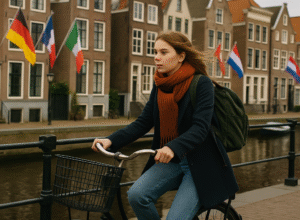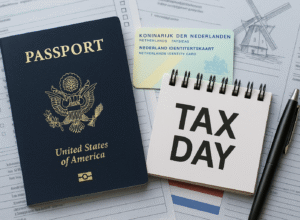The Crossroads Moment
You’re not just daydreaming anymore—you’re ready to leave the United States, or at least get serious about it. Whether it’s healthcare, politics, work culture, or just the sense that something’s broken, the urge to go is real. For many Americans, Europe stands out as a natural destination: democratic, developed, relatively safe.
But Europe isn’t one place. It’s more than 40 countries, each with its own language, laws, and culture. Choosing where to move isn’t just about pulling up roots—it’s about figuring out where you, as an American, can actually build a life.
So, how do you narrow it down?
The Usual Suspects: A Quick Tour of Europe’s Favorites
When Americans start looking into life abroad, a few countries usually rise to the top:
-
Portugal: Known for affordability, coastal towns, and a growing digital nomad scene. Bureaucracy can be slow, and wages are low.
-
Spain: Warm climate, vibrant cities, relaxed pace. Navigating the job market or getting residency can be a challenge.
-
France: Rich in history, strong public services, but also complex systems and language requirements.
-
Germany: High-functioning, stable, and efficient. More rigid socially and administratively.
-
Italy: Gorgeous and culturally rich, but not the easiest place to work or navigate legally.
-
Scandinavia (Sweden, Denmark, Norway): Excellent quality of life, but high cost of living and socially reserved cultures.
And then there’s the Netherlands—often overlooked at first, but increasingly chosen by Americans who want a more balanced, reliable life.
The Head-to-Head: How the Netherlands Compares to Other Top European Destinations
So how does the Netherlands actually stack up when you look at the options side by side?
Let’s go beyond the travel posters and look at how it compares to places Americans often consider. No country is best at everything—but some trade-offs are clearer than others.
Portugal vs. the Netherlands
-
Affordability: Portugal wins—housing, food, and general cost of living are lower.
-
Healthcare: Both offer universal systems, but the Netherlands has shorter wait times and more advanced infrastructure.
-
Job Market: Portugal struggles with low wages and fewer international opportunities. The Dutch economy is stronger and more globally connected.
-
Language: Many Portuguese speak English, but not to the near-universal level you’ll find in the Netherlands.
-
Weather: Portugal, hands down—sunshine and warmth most of the year.
-
Infrastructure: Dutch trains, bike paths, and digital systems are faster and more reliable.
-
Immigration: Portugal has an easier visa process for retirees and digital nomads; the Netherlands is better for entrepreneurs and self-employed Americans (thanks to DAFT).
Who should choose Portugal: Retirees, digital nomads on a budget, sun-seekers.
Who should choose the Netherlands: Workers, families, and people who value systems that just work.
Germany vs. the Netherlands
-
Bureaucracy: Both are rule-bound, but the Netherlands is less rigid and more transparent in practice.
-
Culture: Germany is more formal and hierarchical; the Dutch are famously egalitarian and direct.
-
Work-Life Balance: Both value it, but the Dutch tend to work fewer hours and take more part-time roles.
-
Language: English is more widely spoken and accepted in Dutch workplaces and daily life.
Choose Germany if you want structure and a powerful economy.
Choose the Netherlands if you want the same quality of life, with more cultural flexibility.
France vs. the Netherlands
-
Culture: France is deep and rich—but also proud, and not always welcoming to outsiders. The Dutch are more open and pragmatic.
-
Integration: You’ll need French in most of France. In the Netherlands, you can build a full life in English.
-
Healthcare & Education: Comparable—both excellent. France leans more state-run; the Netherlands mixes public oversight with private options.
-
Work Culture: France protects workers but maintains a strong hierarchy; Dutch workplaces are flatter, more collaborative.
France is ideal for romantics, creatives, and those ready to dive into the culture.
The Netherlands is better for pragmatists who want freedom and function.
Spain vs. the Netherlands
-
Pace of Life: Spain is slower, socially warmer, and more relaxed. The Netherlands is efficient and punctual.
-
Economic Opportunities: The Dutch economy is stronger; Spain has high youth unemployment.
-
Language: Spanish is easier to learn, but you won’t need Dutch to get started in the Netherlands.
-
Paperwork: Spain’s bureaucracy is notoriously slow and inconsistent. Dutch systems are digitized, standardized, and faster.
Choose Spain for lifestyle.
Choose the Netherlands for long-term stability and work-life integration.
Scandinavia (Denmark, Sweden, Norway) vs. the Netherlands
-
Social Systems: All are excellent—free healthcare, strong education, good public services.
-
Cost of Living: The Netherlands is cheaper than all three, especially Denmark and Norway.
-
Social Life: Scandinavians are polite but distant. The Dutch are direct, but more immediately open.
-
Immigration: It’s harder to get long-term residency in Scandinavia unless you have a job offer. The Netherlands offers more flexibility.
Choose Scandinavia for the full welfare-state experience.
Choose the Netherlands for accessibility, affordability, and similar values with less red tape.
A Note on What’s Actually Possible
When it comes to immigration, the decision isn’t always about where you want to go—it’s about where you can. Many European countries have strict, job-offer-based visa systems. Unless you’re being relocated by a company, or you marry a citizen, the odds are slim.
That’s where the Netherlands quietly stands apart: the Dutch-American Friendship Treaty (DAFT) offers Americans a unique pathway to residency as self-employed entrepreneurs. It’s not a loophole—it’s a real, stable option. And that makes it one of the only countries in Europe where an American with remote income or freelance work can realistically build a long-term life.
So even if your heart leans toward the fjords of Norway or the charm of the French countryside, the Netherlands might be the country that actually opens the door.
What Most Americans Are Actually Looking For
When people say they want to move to Europe, they usually mean they’re looking for a few key things:
-
Affordable, quality healthcare
-
A sense of safety and social stability
-
Public transportation that works
-
A better work-life balance
-
English-speaking environments (at least to start)
-
Options for residency and long-term living
-
Political systems that feel less volatile
-
Cultural values that align with equity, sustainability, and community
Many countries in Europe offer some of these. But the Netherlands quietly offers most of them, all at once.
Why the Netherlands Checks So Many Boxes
Here’s what makes the Netherlands a serious contender—not just for travel, but for living.
Language
Nearly 90% of Dutch people speak English, and it’s not just in cities. You can handle banking, immigration, healthcare, and daily life without fluency in Dutch (though learning it helps long-term).
Healthcare
The Dutch system is a mix of private insurance and public regulation. It’s not free, but it’s universal, high-quality, and relatively affordable—especially compared to the U.S.
Work Culture
The Dutch value balance. A 32-hour workweek isn’t unusual. Full-time means something different here, and taking vacations isn’t seen as laziness—it’s expected.
Safety
Low violent crime, strong social safety nets, and a general sense that society is built to support—not punish—you.
Infrastructure
Bikes, trams, and trains make car ownership optional, even in small towns. Cities are compact, clean, and designed with people in mind.
Family Life
If you’re raising kids, the Netherlands consistently ranks as one of the best places in the world to do so. Education is strong, childcare is subsidized, and public parks are everywhere.
LGBTQ+ Rights
Same-sex marriage has been legal since 2001. Anti-discrimination protections are strong, and LGBTQ+ people are part of the social mainstream.
Urban Planning
Dutch cities feel human-scale. Walkable, bikeable, not overwhelming. Even Amsterdam, the capital, feels more like a large town than a sprawling metropolis.
Immigration
-
For Americans, the Dutch-American Friendship Treaty (DAFT) allows self-employed people to live and work here with relatively little red tape.
-
Freelancers and entrepreneurs have additional visa pathways.
-
Residency doesn’t require full-time employment or massive income.
What You Should Know Before You Go
No place is perfect. Here’s what to weigh.
Housing
There’s a housing shortage, especially in cities like Amsterdam and Utrecht. Competition is high, and rental costs can be steep.
Weather
The climate is maritime: grey skies, frequent rain, and wind. If sunshine is a non-negotiable, this might not be your place.
Dutch Directness
People say what they mean—often without softening it. For some Americans, it can feel blunt or even rude at first.
Cost of Living
Not cheap, but generally more predictable and less precarious than major U.S. cities. Healthcare and education costs are especially lower.
Social Integration
Making deep local friendships can take time. But most expats find community through work, hobbies, or international groups.
Who the Netherlands Works Best For
It might not be the best choice if you’re chasing sun, beaches, or a dramatic culture shift. But for certain kinds of people, it’s one of the most livable, functional options out there:
-
Remote workers looking for infrastructure, safety, and sanity
-
Families who want public services and child-friendly cities
-
Progressive-minded people who care about sustainability, equity, and transparency
-
Anyone tired of hustle culture, and ready for a slower, more sustainable life
Final Thoughts: A Quietly Excellent Choice
The Netherlands doesn’t scream for your attention. It doesn’t dazzle like Paris or seduce like Lisbon. But if what you want is a life that makes sense—a life with less friction, more freedom, and a deep respect for balance—it’s worth looking at seriously.
Not flashy. Not dramatic. Just a place that works.
And sometimes, the best choice isn’t the one that makes you dream—it’s the one that lets you begin.








